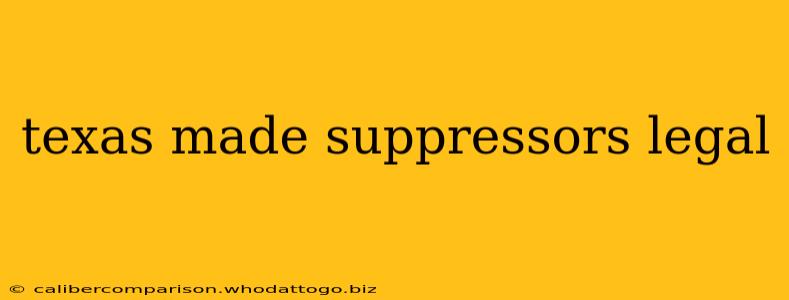The legality of suppressors, often mistakenly called silencers, in Texas is a topic that generates considerable interest among firearm enthusiasts and responsible gun owners. This guide aims to clarify the current legal landscape surrounding the manufacture, possession, and use of suppressors in the Lone Star State. Understanding these laws is crucial for anyone considering owning or using a suppressor in Texas.
Are Suppressors Legal in Texas?
Yes, suppressors are legal in Texas for individuals who comply with all applicable federal and state laws. However, it’s crucial to understand that the process of legally obtaining a suppressor involves navigating both federal and state regulations. This isn't a simple process and requires careful adherence to the law.
Federal Regulations: The National Firearms Act (NFA)
The foundation of suppressor legality lies in the National Firearms Act (NFA) of 1934. This federal law requires that anyone who wants to manufacture, possess, or transfer a suppressor must first obtain a tax stamp from the Bureau of Alcohol, Tobacco, Firearms and Explosives (ATF). This involves a thorough background check and a significant waiting period. This process applies regardless of the state in which the suppressor is acquired or used. Texas law doesn't override or supersede the NFA.
State Regulations: Texas Penal Code
Texas state law doesn't specifically prohibit the possession of suppressors. However, it's vital to ensure compliance with all applicable state laws concerning firearms in general. This includes adherence to licensing requirements, restrictions on carrying firearms in certain locations, and responsible firearm handling practices. Violation of state firearms laws, even when possessing a legally registered suppressor, can result in serious penalties.
Acquiring a Suppressor in Texas: A Step-by-Step Guide
The process of legally acquiring a suppressor in Texas involves several key steps:
-
Finding a Licensed Dealer: Begin by locating a licensed firearms dealer who is registered with the ATF to handle NFA items. These dealers are familiar with the necessary paperwork and procedures.
-
Submitting Form 1 or Form 4: You'll need to file either ATF Form 1 (if you intend to manufacture your own suppressor) or ATF Form 4 (if you are purchasing a commercially manufactured suppressor). Both forms require extensive personal information and detailed descriptions of the suppressor.
-
Background Check and Fingerprint Submission: The ATF conducts a comprehensive background check, including fingerprint submission, to verify eligibility. This check is rigorous and can take several months to complete.
-
Payment of the Tax Stamp: A significant tax is levied on suppressors under the NFA. This tax must be paid before the suppressor can be legally transferred to your possession.
-
Waiting Period: Be prepared for a lengthy waiting period, which can extend for several months, sometimes even longer, before the ATF approves your application and issues the necessary tax stamp.
-
Taking Possession: Once the ATF approves your application and issues the tax stamp, you can then legally take possession of your suppressor.
Responsible Ownership and Use of Suppressors
Even with legal ownership, it's essential to use suppressors responsibly. Understanding local ordinances and regulations regarding their use at shooting ranges or hunting areas is crucial. Remember that while suppressors significantly reduce the sound of gunfire, they do not eliminate it entirely. Always practice safe firearm handling and adhere to all relevant safety protocols.
Conclusion: Navigating the Legal Landscape
Owning a suppressor in Texas is legal but requires navigating a complex web of federal and state regulations. The process involves careful attention to detail, adherence to the law, and patience throughout the ATF approval process. Responsible gun ownership includes understanding and respecting all applicable laws, ensuring safe handling, and using suppressors in compliance with all regulations. Consulting with a knowledgeable firearms attorney or an ATF-licensed dealer is highly recommended before undertaking any steps toward suppressor ownership.

